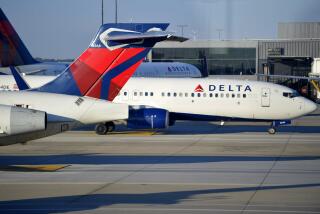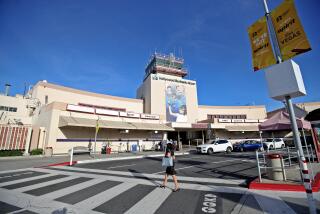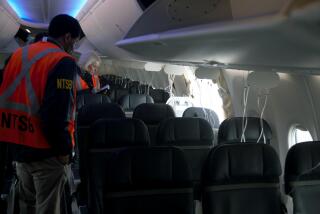Should You Really Look Into That Seat-Back Pouch?
- Share via
Done with breakfast? Good. Now listen to what Mrs. Basil Millan found last Oct. 10 after boarding Delta flight 2112 from LAX to Portland. Her tale, undisputed by airline and cleaning-company officials, raises questions about airline and passenger responsibility, about hygiene and about the logistics of keeping an airline cabin clean while crews are under pressure to spend as little time on the ground as possible.
Millan, who lives in Orange County, was flying north with three companions to attend her mother’s funeral. The jet was a Boeing 757 with 24 first-class seats and 156 coach seats. Millan took a coach seat.
Then, as Millan and her husband, Basil, tell the story, one of Mrs. Millan’s seat mates began to feel ill. As a precaution, Millan reached into the seat-back pouch in front of her and pulled out an airsickness bag. The bag burst, staining Millan’s shoulder, neck and arms with vomit apparently left behind by a previous passenger.
“It was kind of explosive,” said Basil Millan, who was not present but has taken over handling of the matter for the family. His wife, he said, doesn’t want her full name used and “doesn’t want to repeat the story any more. When she thinks about it, the hair crawls on her arms.”
When Mrs. Millan summoned a flight attendant, she wrote in a complaint letter to the airline, the attendant asked “What do you want me to do?” and “was very rude.”
Arriving in Portland without much time to spare, Millan said she was able to change clothes, but was unable to shower before the funeral.
After she returned home, her husband said, Millan scheduled AIDS and hepatitis tests (which have since come back negative, her husband said). On Oct. 17, 10 days after the flight, she wrote Delta headquarters in Atlanta and threatened legal action.
What does Delta say? Spokeswoman Katie Moussouri called the incident “unfortunate” and said a Delta representative has called the Millans to apologize. Beyond that, the Millans’ threat of legal action limits her ability to talk about the case, Moussouri said. But she did assert that it was impossible to know if vomit was deposited during the jet’s previous flight, a Portland-LAX nonstop earlier that day.
The airline’s usual cabin-cleaning regimen, Moussouri said, is to check all seat-back pouches on on-time “turn” flights (those that take on all new passengers and a new flight number, which includes Portland-LAX and LAX-Portland flights), but to make more abbreviated checks on “through” flights and tardy “turn” flights. She added that responsibility in this case may lie with the Texas-based subcontractor that cleans Delta’s planes at LAX (but not in Portland), World Services Co..
And in fact, after Delta brought the case to them, World Services’ top officials made a settlement offer, which the Millans accepted--”a customer service gesture,” said World Services Vice President Joseph Mrozewski, who called the Millans to personally express regrets.
But Mrozewski insists that this isn’t his company’s fault. World Services’ contract with Delta, he said, calls for cleaning bathrooms and galleys, sweeping or vacuuming aisles, tidying up whatever is visible from the aisle and addressing specific problems mentioned by flight crews. But, he said, it doesn’t require them to look inside normal-appearing seat-back pouches on “turn” flights such as the Portland-LAX route.
“In most cases, when an airplane has only 57 minutes ground time, a cleaning crew really doesn’t have a lot of time,” Mrozewksi said.
Delta’s spokeswoman, citing the possibility of legal action, declined to argue further. Airline industry veterans say they’ve never heard of another case like this.
But there is a simple lesson here for all travelers: Don’t take your pouch for granted. Within every 24-hour cycle, several airline representatives said, every major airline sets aside time for thorough cabin cleaning. But several airline representatives supported Mrozewski’s point that schedules don’t allow the time to reach into every pouch after every flight to collect wadded napkins, crumpled cups, stray dollops of gum, and, on rare occasions, worse.
At United Airlines, spokeswoman Mary Jo Holland said, policy calls for seat-back pouch checks between long- and medium-haul flights if they’re running on time, but that “we don’t have that ability” on some tardy flights, or on quick turnarounds.
At American, spokesman Tim Smith said that “cabin crews look for anything obvious sticking out or out of order in between every flight. The pouches get a more thorough inspection during the overnight cleaning that every aircraft receives” daily.
Jill Gallagher of the Washington-based Assn. of Flight Attendants doubts that any airline is able to reach into every seat back all the time. And Gallagher’s union (which represents 42,000 flight attendants on 27 airlines, not including Delta) isn’t known for taking sides with airlines. At Southwest Airlines, public relations director Ed Stewart contends the airline’s crews, famous for their quick turnarounds, have never had such a complaint. But he professed some sympathy for Delta.
“In real life on the planet Earth, what’s reasonable?” Stewart asked. “I’m sure if [Delta] had 60 to 70 people working the plane, that wouldn’t have happened. But would you want the price of your airline ticket quadrupled?”
Reynolds travels anonymously at the newspaper’s expense, accepting no special discounts or subsidized trips. He welcomes comments and suggestions, but cannot respond individually to letters and calls. Write Travel Insider, Los Angeles Times, Times Mirror Square, Los Angeles 90053 or e-mail chris.reynolds@latimes.com.
More to Read
Sign up for The Wild
We’ll help you find the best places to hike, bike and run, as well as the perfect silent spots for meditation and yoga.
You may occasionally receive promotional content from the Los Angeles Times.







